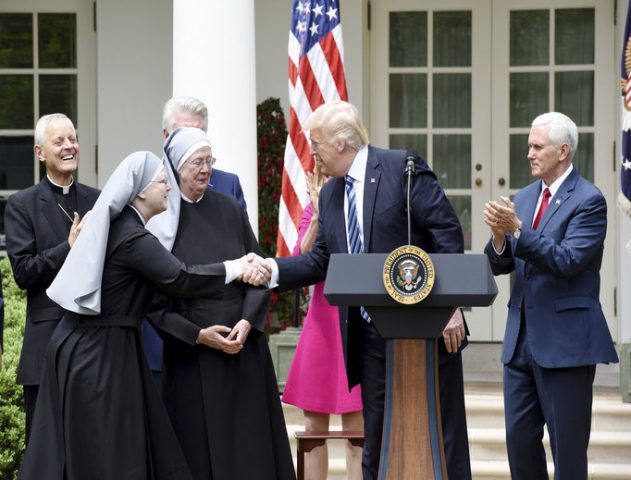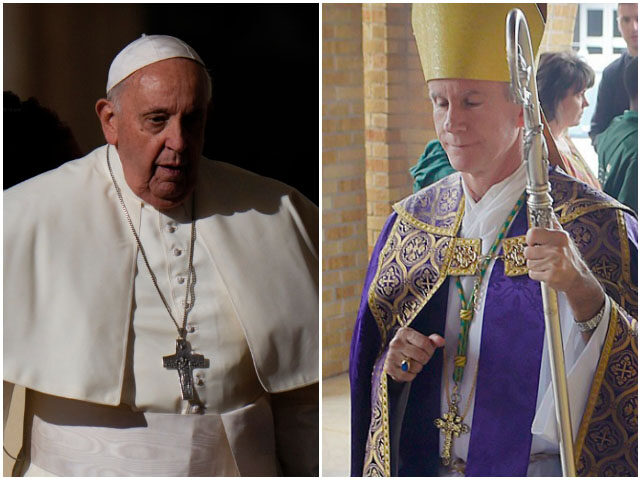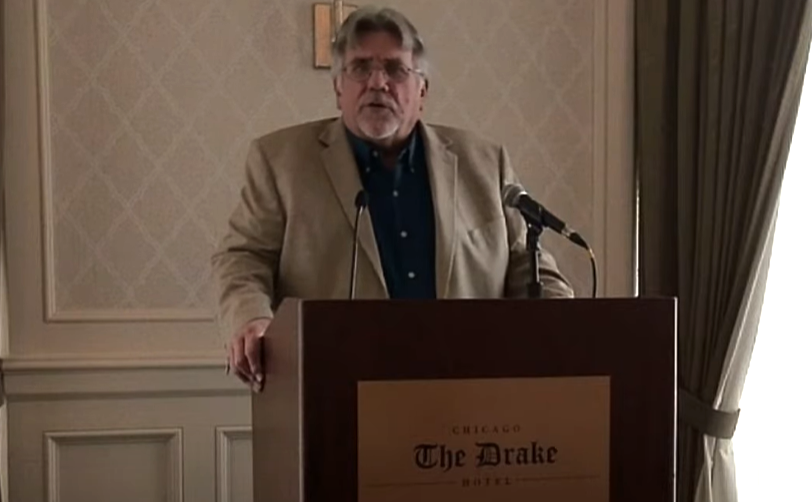Photo: President Donald Trump greets on stage the Little Sisters of the Poor, flanked by Cardinal Donald Wuerl of Washington and Vice President Mike Pence, before signing the executive order on promoting free speech and religious liberty during a National Day of Prayer event in the Rose Garden of the White House in Washington, D.C., May 4. (Olivier Douliery/Abaca (Sipa via AP Images)
Led by California and Pennsylvania, a number of states are challenging the Trump administration’s religious and moral exemptions from the federal contraceptive mandate.
WASHINGTON — Two federal courts will soon hear preliminary arguments in lawsuits filed by states that are challenging the Trump administration’s religious and moral exemptions from the federal government’s contraceptive mandate.
Led by the attorneys general of California and Pennsylvania, the legal challenges argue that the administration is illegally limiting women’s access to birth control. The lawsuits are seeking a nationwide injunction on the new rules that protect religious groups like the Little Sisters of the Poor from having to cover abortifacients and other forms of contraception in their employee health insurance plans.
The new rules were issued about five months after President Donald Trump signed an executive order on religious liberty, where he instructed the secretaries of the Departments of Treasury, Labor, and Health and Human Services to issue “amended regulations … to address conscience-based objections” to the HHS mandate.
Attorneys representing the Little Sisters of the Poor — who Trump said “were incredible nuns who care for the sick, the elderly and the forgotten” when he signed the executive order — have filed to intervene in those state lawsuits, which the lawyers say lack merit and are tailored to score political points at the expense of religious organizations with sincere moral objections to paying for all government-approved forms of birth control, including sterilization and so-called emergency contraception.
“No one needs nuns in order to get contraceptives, and no one needs these guys reigniting the last administration’s divisive and unnecessary culture war,” said Mark Rienzi, senior counsel at Becket, the public interest law firm that represents the Little Sisters of the Poor and several other religious nonprofits that filed suit against the mandate during Barack Obama’s presidency.
Lori Windham, who is also a senior counsel with Becket, told the Register that California Attorney General Xavier Becerra, Pennsylvania Attorney General Josh Shapiro and their fellow plaintiffs were absent over the last several years while the religious nonprofits were fighting the mandate in the federal courts.
“They didn’t try to get involved or interfere in the religious groups’ cases,” Windham said. “They waited until the administration did something, and then they sued the administration and tried to cut the religious groups out of it.”
Said Windham, “We’ve told the court that the states are trying to decide the Little Sisters’ rights without the Little Sisters being in the courtroom, and that’s wrong. [The courts] need to let [the Little Sisters] intervene in the case and let them defend their rights.”
Hillary Byrnes, assistant general counsel for the U.S. Conference of Catholic Bishops, told the Register that the suing states “are making very aggressive legal arguments that would undermine basically any religious exemptions contained in law.”
“The states’ arguments go against our country’s long tradition of religious liberty and pluralism,” Byrnes said. “We commend the federal government for protecting those with religious or moral objections to the HHS contraceptive mandate, and we fully support the exemptions provided in the October 2017 regulations.”
The States’ Claims
In prepared statements explaining their reasons for filing the lawsuits, the attorneys general of California and Pennsylvania argued that the new rules are unconstitutional because they single out and harm women, violating their Fifth Amendment rights to equal protection under the law.
“A woman’s birth control and health decisions should be made by a woman in consultation with her doctor — not by her employer and not by politicians,” Becerra said, adding that he would not stand by while the Trump administration “continues to disregard the rule of law.”
In a news conference after the U.S. Department of Health and Human Services’ interim final rules were released Oct. 6, Shapiro said the administration had violated the rule of law in the manner that it promulgated the new regulations.
“The federal government — under the direction of the Trump administration — broke the law and undermined the health and economic independence of American women,” Shapiro said.
Under the first of two companion interim final rules, entities that have sincerely held religious beliefs against providing contraceptives are no longer required to do so. The second rule applies the same protections to organizations and small businesses that have objections based on moral convictions instead of religious beliefs.
The HHS contraceptive mandate remains in place for the vast majority of employers in the United States. Government officials and attorneys who represent the religious nonprofits have said the new exemptions only affect about 200 entities. Several corporations — such as Pepsi, Exxon, Visa and Chevron — and entities like the U.S. military and New York City have been exempt from the mandate since it was first issued in 2011.
“It’s pretty telling that these states didn’t sue the Obama administration when large corporations like Exxon and Visa were originally exempt from the HHS mandate back when this all came about,” said Melanie Israel, a research associate at the DeVos Center for Religion and Civil Society at The Heritage Foundation.
Israel told the Register that the suing state officials are “just trying to throw everything at the wall and see what sticks.”
Said Israel, “I think it’s pretty disingenuous for them to not have had a problem when tens of millions of women were exempt from this mandate back when it came about, but now, all of a sudden, after all these years of litigation with the Little Sisters winning their cases, they suddenly think it’s a horrible thing that nuns are exempt from the mandate. It’s just a very disingenuous argument.”
Other Arguments
Besides the constitutionality claims, the lawsuits claim that the new rules allow employers to discriminate against employees through their religious beliefs.
The lawsuits make a host of other arguments, including a claim that the rules were crafted without properly notifying the public for offering the opportunity for input. The lawsuits also allege violations of the Pregnancy Discrimination Act and Title VII of the Civil Rights Act of 1964.
In addition, the lawsuits argue that contraception is important medicine that “improves the social and economic status of women” and that the new rules threaten to not only hold women back in society and the workplace, but will create new cost burdens on the states because they will have to cover those services in place of employers.
Robert Destro, a law professor and director of the Institute for Policy Research and Catholic Studies at The Catholic University of America, told the Register that the states “completely misunderstand” the underlying legal issues in the case.
“This whole idea that you’re entitled to have somebody pay for your birth-control pill is kind of ridiculous,” Destro said.
Joining California’s lawsuit as co-plaintiffs are the states of Delaware, Maryland, New York and Virginia. Other states have filed similar challenges in the federal courts.
Hours after the new rules were issued, Massachusetts Attorney General Maura Healey announced that she had filed a complaint in U.S. district court in Boston to block them.
Douglas Laycock, a professor at the University of Virginia School of Law who writes about religious-liberty cases, told the Register that he does not believe the lawsuits’ constitutional and discrimination claims are going anywhere.
“The [Supreme] Court has repeatedly, and unanimously, rejected constitutional challenges to religious exemptions. And I think it would reject this one,” said Laycock, who added that there could be substance to the claims that the rules violate the Administrative Procedure Act, which governs the manner in which federal administrative agencies may propose and establish regulations.
“This was done without notice and comment,” Laycock said. “That could be fixed, but it would entail a significant delay.”
Hearings and Settlements
Becket’s Windham said hearings have been scheduled Dec. 12 in the California lawsuit and Dec. 14 for the Pennsylvania case. On Nov. 21, Becket filed to intervene on the Little Sisters’ behalf in both jurisdictions.
“It’s an unusually quick hearing schedule, and we had to act quickly, too, because the states are trying to get rulings before the end of the year,” Windham said.
While the courts prepare to hear those challenges, Windham said settlement negotiations are ongoing in dozens of lawsuits filed by religious nonprofits, including the EWTN Global Catholic Network. The Register is a service of EWTN. Becket represents EWTN.
In May 2016, in Zubik v. Burwell — a consolidated case that included the Little Sisters of the Poor as plaintiffs — the U.S. Supreme Court remanded dozens of religious nonprofit cases to the appellate courts, with instructions for the attorneys on both sides to work out a solution for contraceptives to be delivered in a manner that respected the plaintiffs’ religious liberty.
In the interim final rules, attorneys representing the nonprofits said the federal government admitted that it previously broke the law by not providing for a wider religious exemption in the contraceptive mandate.
“All this demonstrates why it’s important for the religious groups to be able to come in and protect their own rights because their cases against the government are still going on, and the states are trying to stay away from those cases and bring their own cases in more favorable jurisdictions,” said Windham, who accused the California and Pennsylvania attorneys general of trying to “cherry-pick their courts in hopes they can get their names in the news.”
Said Windham, “The reality is they are hurting the Little Sisters of the Poor, they are hurting the people they serve, and these lawsuits are hopefully going to lose.”
Register correspondent Brian Fraga writes from Fall River, Massachusetts.







